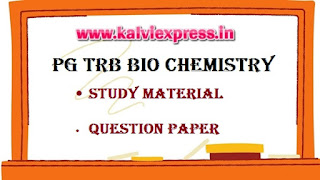PG TRB BIO CHEMISTRY
PG TRB Bio Chemistry Study Material , PG TRB Bio Chemistry Study Material in pdf , PG TRB Bio Chemistry Study Material unit wise , PG TRB Bio Chemistry question paper, PG TRB Bio Chemistry original question paper , PG TRB Bio Chemistry Answer key , PG TRB Bio Chemistry unit wise study material , PG TRB Bio Chemistry unit wise study material in Tamil medium , PG TRB Bio Chemistry unit wise study material in English medium, PG TRB Bio Chemistry syllabus
PG TRB Bio Chemistry Study Material
PGTRB-BIO-CHEMISTRY UNIT II- Study Material- -(English Medium)- Srimaan Coaching Centre-Trichy
PG TRB Bio Chemistry syllabus unit wise
PG TRB Bio Chemistry syllabus in Pdf
Unit I : Techniques in Bio-Chemistry Principles and application of light, phase contrast, Fluorescence, scanning and Transmission electron microscopy. Cytophotometry; Gel filtration; HPLC, Ultracentrifugation; X-ray diffraction; Fluorimetry; spectroscopy (UV, DRD/CD, visible, NMR, ESR, Atomic absorption and plasma emission); Principles and application of tracer techniques in biology, Liquid scientillation spectrometry.
Unit II : Chemistry of Bio-Molecules Structure of carbohydrates, Polysaccharides, Glycoproteins, Peptidoglycans, cell wall polysaccharides; structure of aminoacides and proteins, forces involved, Ramacha.ndran Plot. Structure of Purine, Pyrimidine bases, Nucleotides, DNA, different types of RNA and vitamins.
Unit III : Metabolosm Metabolosm of Carbohydrates, Aminoacids, lipids and Nucletic acids, Respiratory chain, oxidative phosphoerylation, free energy change; coupled reactions: Biological energy transducers; High energy compounds and group transfer potentials; Bio-energetics.
Unit IV : Enzymes Enzyme kinetics; Regulation of enzyme activity Coenzymes, Activators / inhibitors, isoenzymes; Mechanism of enzyme action.
Unit V : Clinical Bio-Chemistry Disorders of carbohydrate, Fat and Nitrogen, Metabolisms, Laboratory Dignosis, Liver and Kidney function tests; Blood coagulation disorders; Inborn errors of metabolism.
Unit VI : Bio - Membranes Structures and organization of membranes, hormones - structure, function and its role in signal transduction, Neurotranmitters; Transport across Membranes.
Unit VII : Microbial Bio-Chemistry Classification of Micro-organisms - Viruses, bacteria, Fungi,Yeast; Basic principles of Bioprocess technology, Fermentation products - ethanol, glycerol, lacticacid, acetone, riboflavin, vitamin B12 and Pencillin, Preparation of media to culture microorganisms, Soil microbiology; use of micro organisms in seage treatment.
Unit VIII : Molecular Biology Prokaryotic and Kukaryotic cell structure; Eukaryotic genome organisation; cell cycle, Replication, Transcription, Tranlation and Regulation of Gene Experssion; Lysogency and Lytic cycles in bacteriophages; bacterial transformation; principles of Geneticengineering Enzymes, vectors, C DNA and Genomic Libracy construction; Screening of Libraries; Western, Nothern and Southern blotting; Agarose Gel and SDS PAGE Electrophoresis; Dot Blot analysis; DNA sequencing methods; Autoradiography; Transgene Technology; PCR and its application, RFLP, RAPD; Molecular Pathogenesis of Cancer.
Unit IX : Immunology Antigens, Immunoglobulines, T and B Lymphocytes and their characterization; monpo-clonal antibodies; Accessory cells - Macrophages and Dendritic cells; Purification of immunologlobulins - Ion exchange and affinity chromate-graphy; Enzyme Linked Immunoabsorbant Assay, vaccines; Hypersensitivity reactions: Auto immunity, Antibody engineering; Antigen Presentation; Ratio immunoassay. Unit X : Tissue CulturePrimary cultures derived from plant, animal and human tissues, Maintenance of cell lines; Artifical Insemination technology; Callus culture; Sornaclonal Variation Micropropagation; somatic embrygenesis; protoplast fusion; artificial seeds.




0 Comments
Post a Comment
குறிப்பு
1.KALVIEXPRESS வாசகர்கள் அனைவரையும் அன்புடன் வரவேற்கிறோம்..
2.அனைவரும் தங்கள் பெயர் மற்றும் மின்அஞ்சல் முகவரி கொடுத்து தங்கள் கருத்தை பதிவு செய்யவும்..
3.இங்கு பதிவாகும் கருத்துக்கள் வாசகர்களின் சொந்த கருத்துக்களே இதற்கு KALVIEXPRESS எந்த விதத்திலும் பொறுப்பு ஆகாது..
4.பொறுத்தமற்ற கருத்துக்களை நீக்கம் செய்ய KALVIEXPRESS வலைதளத்திற்கு முழு உரிமை உண்டு..